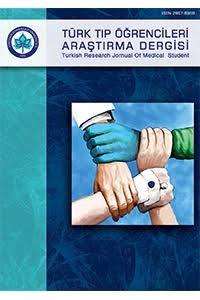Zeynep KÜSKÜ KİRAZ,
Evin KOCATÜRK,
Zeynep Sena YILMAZ,
Ogün Alp YEŞİLTAŞ,
Fatma İrem KAYA,
Çiğdem ALMAZ,
Bahattin ARISOY,
Mehmet Alp KAYNAR,
Ebubekir YİĞİTBAY,
Ayşenur SARI,
Seda Nur TAŞ,
Özhan DÖNGÜL,
Onur Can KILINÇ,
Fereshta M. ZAHER
124113
Doktorlar Ölümcül Hastalık Tanısını Nasıl Söylemeli: Üniversite Öğrencilerinin Bakış Açısı
Hekimler, zaman zaman hasta ve yakınlarına kötü haber vermek zorunda kalırlar ve bunu zaman içinde elde ettikleri bilgi, tutum ve beceriler doğrultusunda gerçekleştirirler. Hastanın tanısını öğrenme şekli, tanıyı söyleyen hekimin tavırları ve hastanın o an içinde bulunduğu diğer koşullar; hastanın durumunu kabul etmesini ve tedavi sürecindeki motivasyonunu etkileyebilir. Biz bu çalışmada ‘ölümcül hastalıklarda hastanın tanısını öğrenme sürecinin hastalara etkisi’ konusunda tıp fakültesi öğrencileri ile diğer fakülte öğrencilerinin konuya bakış açılarını değerlendirilmeyi amaçladık. Anket, katılımcıların demografik bilgileri ve konuya ilişkin görüşlerinin alındığı toplam 16 sorudan oluşturuldu. Görüşlere ilişkin soruların ‘Katılmıyorum’. ‘Emin değilim’ veya ‘Katılıyorum’ olarak cevaplanması istendi. Anket, dijital ortamda gönüllülere ulaştırıldı. Yanıtlar, SPSS paket programı kullanılarak istatistiksel olarak değerlendirildi. Çalışmamıza Tıp Fakültesi dışı diğer fakülte öğrencilerinden 258, Tıp Fakültesi ilk 3 sınıf (1-3) öğrencilerinden 261 ve Tıp Fakültesi son 3 sınıf (4-6) öğrencilerinden 134 olmak üzere toplam 653 öğrenci katıldı. Ölüm kaygısı olmayan katılımcıların ne kadar ömrü kaldığını bilmeyi isteme oranı ölüm kaygısı olanlara oranla daha yüksek bulundu (p=0.01). Katılımcıların % 84.7’si, ölümcül bir hastalığı olması durumunda; tanıyı ve tedavi seçeneklerini açıkça öğrenme hakkı olduğunu düşünmekteydi. Katılımcıların çoğu tanı bilgisinin hastaya verilme şeklinin hastanın tanıyı kabullenmesinde (% 78.4) ve iyileşmesinde (% 63.2) etkili olacağını ve doktorun hastaya kötü haber vermesi için eğitim ve deneyime ihtiyacı olduğunu (%86.4) düşündüler. Doktorun tanıyı söyleyiş şekli ve tanıyı bilmenin hastanın iyileşmesine etki edebileceği sorularına verilen yanıtlar öğrencilerin bölümleri arasında anlamlı fark gösterdi (p<0.5). Tıp Fakültesi 4-6. sınıf öğrencileri ölümcül hastalık tanısı söyleme şeklinin kabullenme sürecine etkisi olduğuna diğer öğrencilerden daha fazla katılırken, iyileşme sürecine etkisine katılma oranları daha düşük bulunmuştur. Bu çalışmada katılımcıların çoğu, doktorun hastaya tanısını ve tedavi seçeneklerini olumlu ya da olumsuz bütün açıklığıyla anlatması gerektiğini belirtti. Bu çalışma sonuçları, doktorun hastaya kötü haber vermesinin eğitim ve deneyim gerektiren bir durum olduğunu düşündürmektedir
How Doctors Should Say the Diagnosis of a Life-Threatening Disease: The Perspective of University Students
Physicians sometimes have to give bad news to patients and their relatives and they do this with their knowledge, attitude and skills they have acquired over time. The attitudes of the physician while telling the diagnosis and the patient’s conditions at that moment may affect the patient's acceptance and motivation during the treatment process. In this study, we aimed to evaluate the differences between medical students and other faculty students about the process of learning life-threatening illness diagnosis. The questionnaire was composed of 16 questions about the participants' demographic information and opinions on the subject. Questions about opinions were answered as ‘I disagree’, ‘I'm not sure’ or ‘I agree’. The questionnaire was delivered to volunteers in digital environment. Responses were evaluated statistically using SPSS package program. A total of 653 students, 258 from non-medical faculties, 261 from the first 3 grade (1-3) medical students and 134 from the last 3 grade (4-6) medical students participated in our study. The percentage of participants who has not death anxiety wanted to know how long their life was left was higher than those with a death anxiety (p = 0.01). 84.7% of the participants choose that if they have a life-threatening illness, they have right to learn all about the diagnosis and treatment options. Most of the participants thought that the way of learning the diagnosis would be effective in accepting the disease (78.4%), in therapy process (63.2%). 86.4% said that the doctors need training and experience to give a bad news. The answers given to the questions about the possible effects of learning the diagnosis showed a significant difference between the departments of the students (p <0.5). Grade 4-6 medical students were more likely to confirm that the way of telling a diagnosis can have effects patients’ acceptance. And they less confirmed that the way of telling a diagnosis can have effects patients’ healing than other students. In this study, most of the participants stated that the doctor should clearly explain the diagnosis of a life-threatening illness and treatment options to the patient. Also our results suggest that giving bad news to the patient is a situation that requires training and experience.
___
- 1. Mehmet Emin Demirkol, Filiz Koç, Çukurova Üniversitesi Tıp Fakültesi Psikiyatri Ve Nöroloji Anabilim Dalı, Kötü Haber Verme Teknikleri, www.noroloji.org.tr.
- 2. Zısook S, Zısook SA. Ölüm, ölmek ve yas: In Comprehensive Textbook of Psychiatry. Aydın H, Bozkurt A (Çeviri ed.), İstanbul: Güneş Kitabevi, 2007, 2367-92.
- 3. Ulgen H. Okyayuz, Ölümcül Hastalık Tanısı Almak: Bir Yaşam Krizi Kötü Haber Verilmeli mi? Kriz Dergisi 11;29-35.
- 4. Ayşe Özkıriş, Gülcan Güleç, Çınar Yenilmez Ve Ark. Hekim Tutumları Üzerine Bir Çalışma: Ölüm Ve Ölümcül Hastaya Yaklaşım, Düşünen Adam Psikiyatri Ve Nörolojik Bilimler Dergisi 2011;24:89-100.
- 5. Orlander JD, Fincke G, Hermanns D, Johnson GA et al. Medical residents’ first clearly remembered experiences of giving bad news. J Gen Intern Med 2002;17:825-31.8
- 6. Oğuz NY, Şenol S, Devrimci Özgüven H, Arıkazan M, Özen AR, Ünal Ş. et al. Ankara’da çalışan hekimlerin ötenazi ile ilgili görüşlerini belirlemeye yönelik bir anket çalışması. 3P Dergisi 1996; 4:43-8.
- 7. Tavolli A, Mohagheghi MA, Montazeri A, Roshan R, Tavoli Z, Omidvari S. et al. Anxiety and depression in patients with gastrointestinal cancer: does knowledge of cancer diagnosis matter? BMC Gastroenterol 2007;7:28.
- 8. Miyata H, Tachimori H, Takahashi M, Saito T, Kai I. et al. Disclosure of cancer diagnosis and prognosis: a survey of the general public’s attitudes toward doctors and family holding discretionary powers. BMC Med Ethics 2004; 5:E7.
